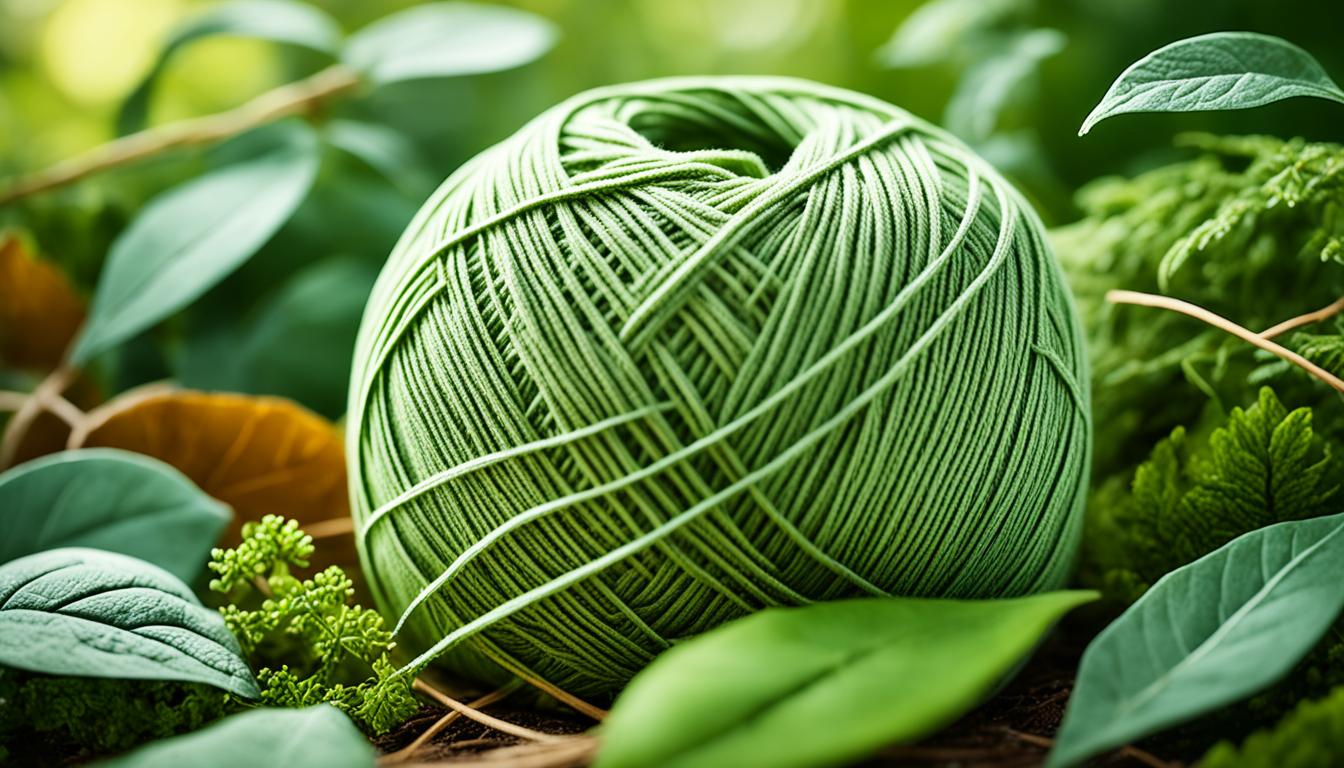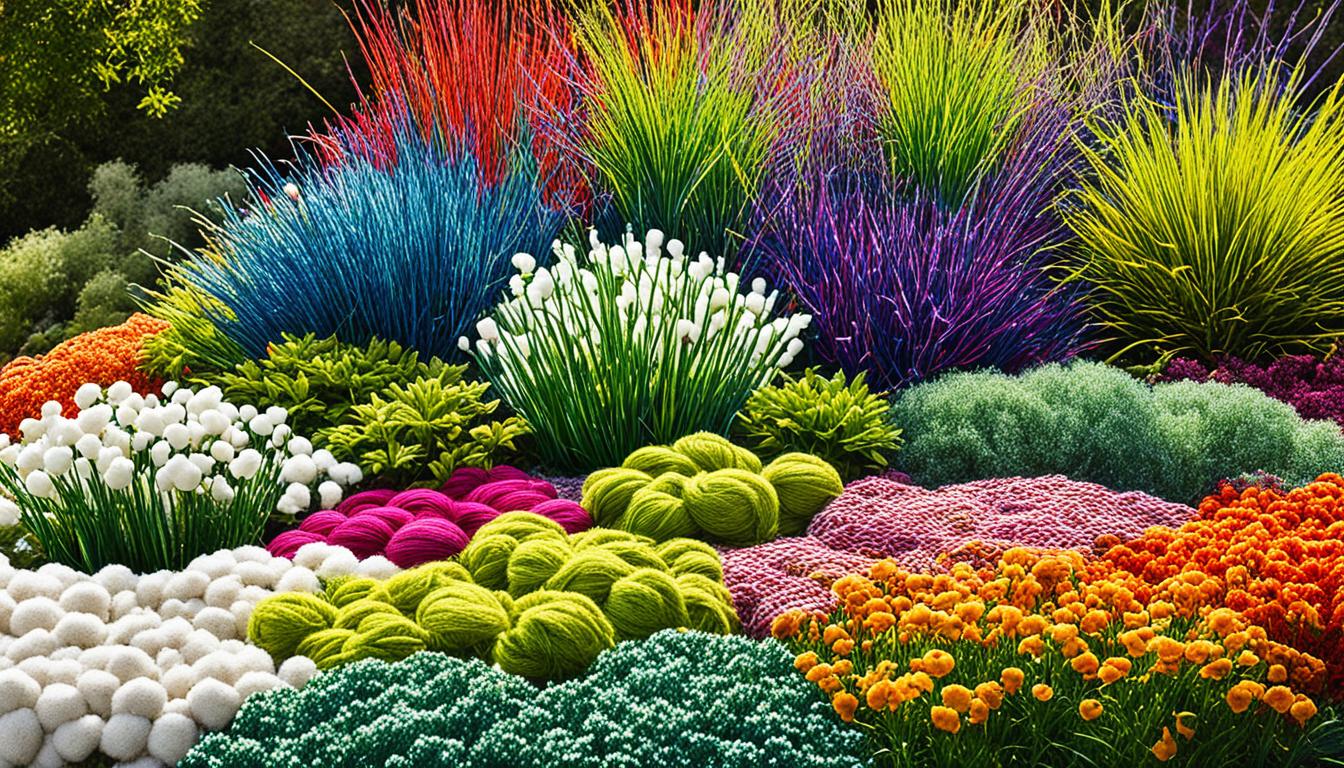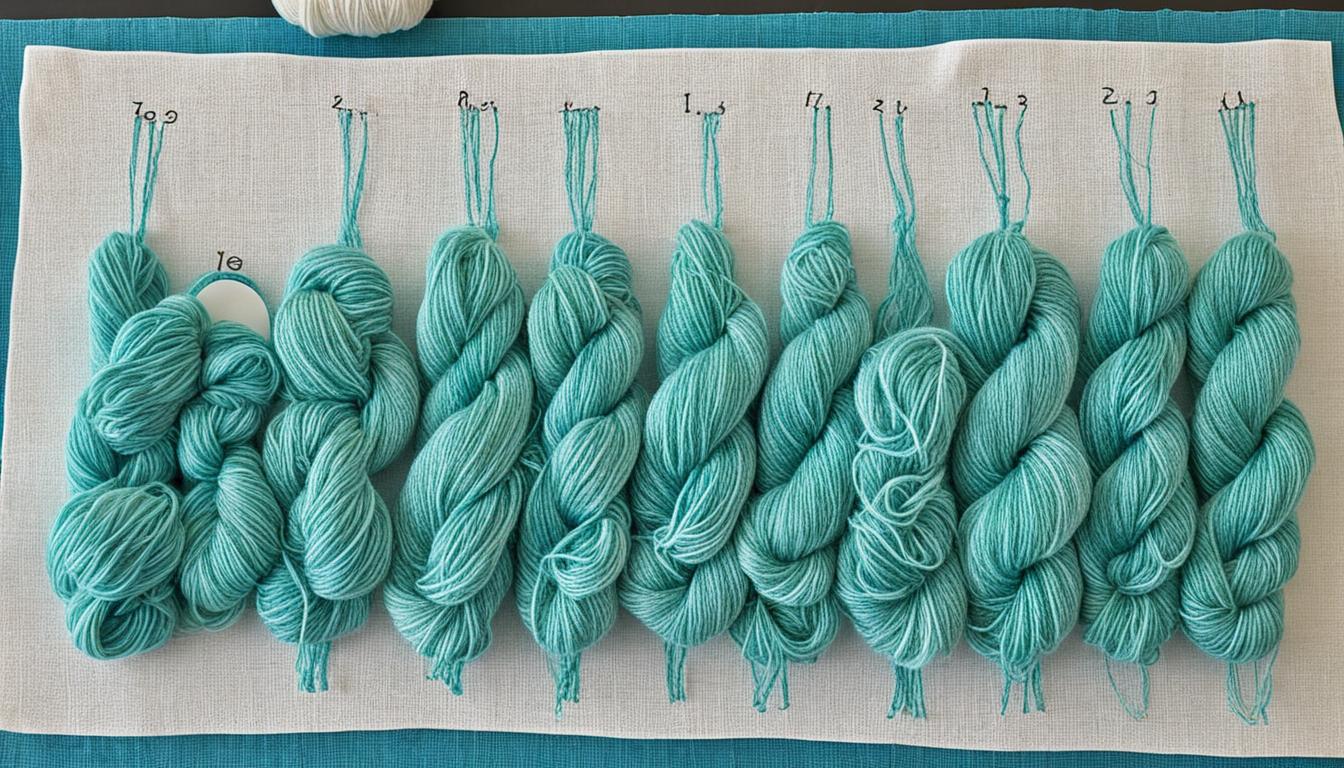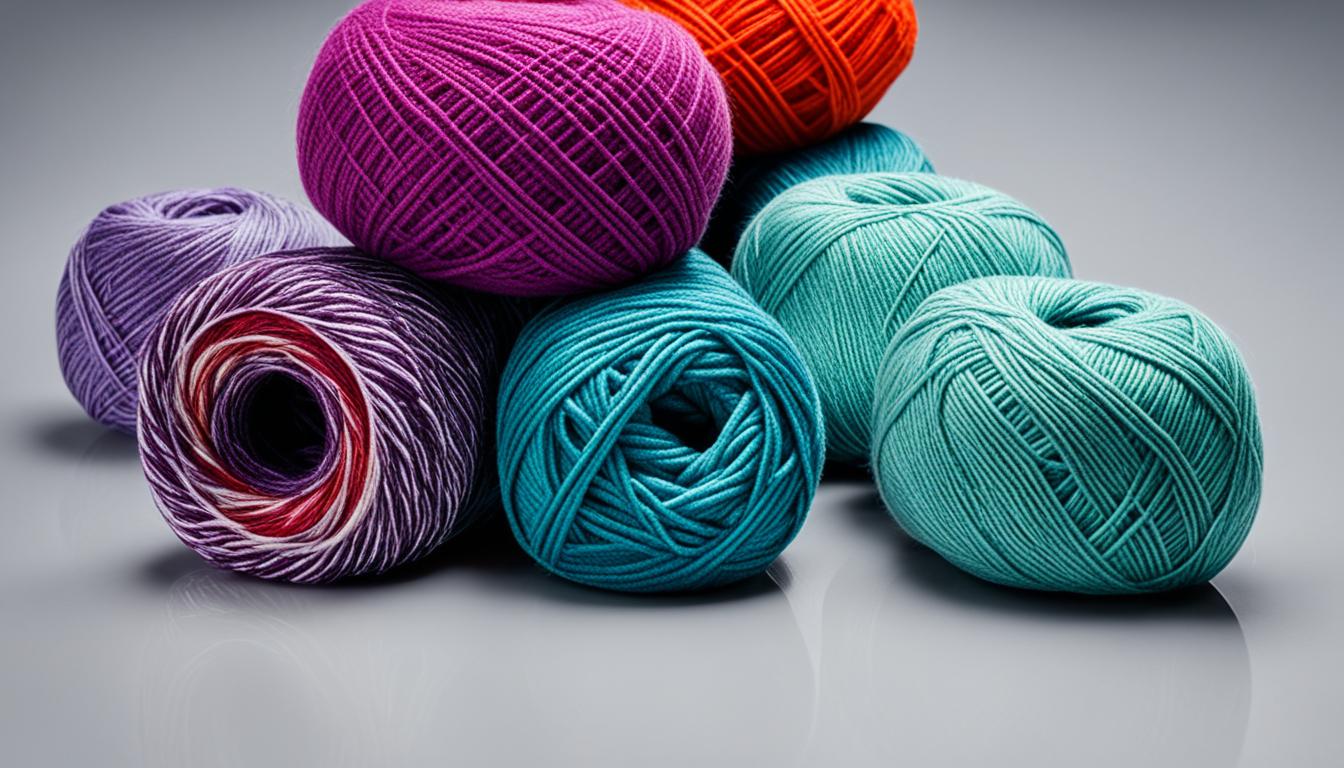Yarn has been a traditional material in the crafting community, but with a growing focus on environmental considerations, it’s important to question: is yarn environmentally friendly? Though it may appear straightforward, the answer is multifaceted. Come with us as we delve into the different facets of yarn manufacturing, its eco footprint, and find sustainable alternatives that resonate with our beliefs.
When we think about eco-friendly crafting, our focus is on using materials that minimize harm to the planet. Yarn, being at the heart of many creative projects, plays a significant role in determining whether our crafts are truly sustainable. So, let’s delve into the yarn industry and uncover the truth about its environmental impact.
Key Takeaways:
- Understanding the environmental impact of yarn production
- Eco-friendly alternatives to acrylic and polyester yarns
- The benefits of using sustainable yarns
- Exploring different types of eco-friendly fibers
- Where to find organic cotton yarns and other sustainable options
The Environmental Impact of Acrylic and Polyester Yarns
When it comes to crafting, acrylic and polyester yarns are popular choices due to their affordability and versatility. However, it’s important to consider their environmental impact. These synthetic fibers are derived from petrochemicals, making their production resource-intensive and energy-consuming. Consequently, acrylic yarn environmental impact and polyester yarn environmental impact are significant concerns for eco-conscious crafters.
One notable environmental issue with acrylic yarn is microplastic shedding. During the washing and wearing of acrylic garments, tiny fibers break off and enter water sources. These microplastics not only persist in the environment but also pose a threat to marine life. Additionally, the production process of these yarns often involves the use of toxic chemicals, which can have detrimental effects on both human health and the environment.
“The synthetic nature of acrylic and polyester yarns raises serious environmental concerns. The shedding of microplastics and the use of toxic chemicals in their production contribute to ecological damage.”
To visualize the environmental impact of acrylic and polyester yarns, consider the following table:
| Environmental Impact | Acrylic Yarn | Polyester Yarn |
|---|---|---|
| Resource Intensity | High | High |
| Energy Consumption | High | High |
| Microplastic Shedding | Significant | Minimal |
| Toxic Chemicals | Used in production | Used in production |
Note: Environmental impact may vary based on specific manufacturing practices.
Given the environmental concerns associated with acrylic and polyester yarns, many crafters are seeking more sustainable alternatives. In the next section, we will explore various sustainable yarn options that offer a greener approach to crafting.

Babysoft Cotton Yarn, Yarn E-verse, 100% Organic Cotton, Soft & Hypoallergenic, Ideal for Baby Knitting, Crocheting, Amigurumi & DIY Projects, Organic Textile Certified, 50g (1, 115 White)
🌿 100% ORGANIC & HYPOALLERGENIC: Made from certified organic cotton, free from harmful chemicals, making it safe for…
As an affiliate, we earn on qualifying purchases.
As an affiliate, we earn on qualifying purchases.
Sustainable Yarn Options for Eco-Friendly Crafting
When it comes to eco-conscious crafting, there are numerous sustainable yarn options available that can help reduce our environmental impact. These options include organic cotton yarn, bamboo yarn, hemp yarn, and recycled yarn. Let’s explore each of these options in more detail:
Organic Cotton Yarn
Organic cotton yarn is a fantastic choice for environmentally conscious crafters. It is made from cotton crops that are grown without the use of synthetic fertilizers or pesticides. By choosing organic cotton yarn, you support sustainable farming practices and help protect the environment from harmful chemicals.
Bamboo Yarn
Bamboo yarn is derived from the fast-growing bamboo plant, making it a sustainable alternative to traditional yarns. Bamboo requires minimal water and pesticides to grow, making it an eco-friendly option for crafters. This yarn has a soft and silky feel and is available in a wide range of colors, making it perfect for various crafting projects.
Hemp Yarn
Hemp yarn is made from the durable hemp plant, which is naturally resistant to pests and requires minimal water. It is a highly sustainable option that offers strength and durability to your projects. Hemp yarn has a unique texture and is ideal for creating bags, accessories, and home decor items.
Recycled Yarn
Recycled yarn is made from post-consumer waste materials such as plastic bottles and textiles. By utilizing recycled yarn, you help reduce landfill waste and promote a more circular economy. Recycled yarns come in different blends and are available in various weights, making them versatile for a wide range of crafting projects.
By exploring these sustainable yarn options, you can make a positive impact on the environment without compromising on the quality of your creations. Incorporating these eco-friendly yarns into your projects not only reduces your carbon footprint but also supports the growth of a more sustainable crafting industry.
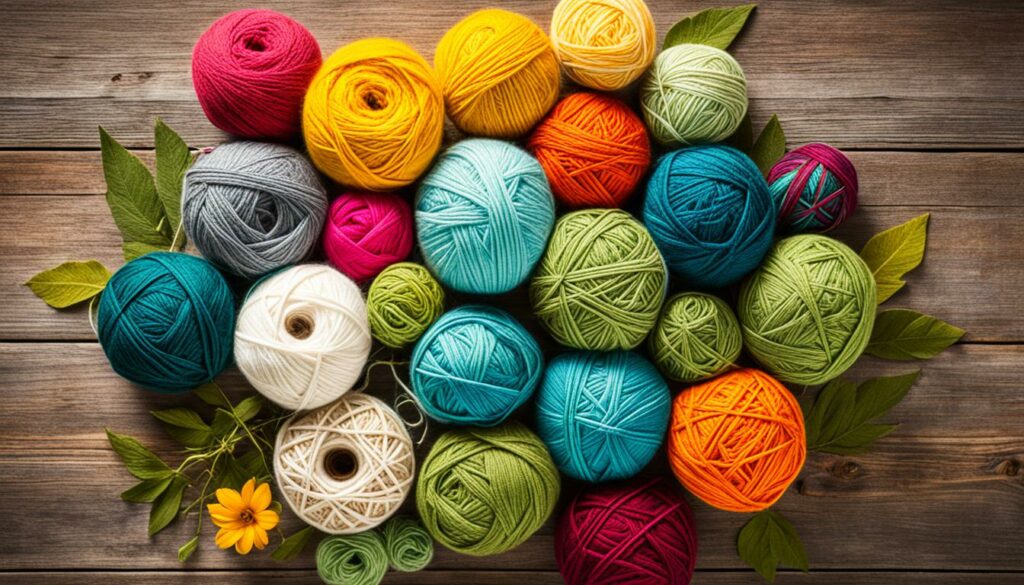
| Yarn Option | Description |
|---|---|
| Organic Cotton Yarn | Made from cotton crops grown without synthetic fertilizers and pesticides. |
| Bamboo Yarn | Derived from the fast-growing bamboo plant, requires minimal water and pesticides. |
| Hemp Yarn | Made from the durable hemp plant, naturally resistant to pests and requires minimal water. |
| Recycled Yarn | Made from post-consumer waste materials such as plastic bottles and textiles. |

JubileeYarn Bamboo Cotton Sport Yarn – 50g/Skein – Shades of Neutral Tones – 4 Skeins
CONTENTS 4 skeins per pack
As an affiliate, we earn on qualifying purchases.
As an affiliate, we earn on qualifying purchases.
Benefits of Sustainable Yarns
When it comes to choosing yarn for your crafting projects, opting for sustainable options offers a multitude of benefits. Sustainable yarns not only minimize harm to the environment but also have several advantages over traditional yarns.
Softness and Breathability
Sustainable yarns are often praised for their exceptional softness and breathability. Crafted from natural fibers, such as organic cotton, bamboo, and hemp, these yarns have a luxurious feel against the skin. The natural fibers allow for improved airflow, making sustainable yarns ideal for warm weather projects and individuals with sensitive skin.
Durability for Longer-Lasting Garments
One of the key advantages of sustainable yarns is their durability. Due to their eco-conscious production methods, these yarns are carefully crafted to withstand the test of time. Whether you’re knitting cozy sweaters or crocheting durable home decor items, sustainable yarns ensure that your creations remain intact for years to come.
Ethical Production
When you choose sustainable yarns, you are not only prioritizing the environment but also supporting ethical production practices. Many sustainable yarns are produced using fair trade principles, ensuring that the individuals involved in the production process are treated fairly and paid a living wage. By opting for these yarns, you contribute to a more just and sustainable industry.
Additionally, sustainable yarns are often sourced from renewable resources, minimizing the impact on ecosystems and reducing the carbon footprint. This conscious choice allows you to feel good about your crafting endeavors and take an active role in creating a more sustainable future.
| Benefits of Sustainable Yarns |
|---|
| Softness and Breathability |
| Durability for Longer-Lasting Garments |
| Ethical Production |
By selecting sustainable yarns for your projects, you can enjoy the softness, breathability, and durability while knowing that you are making a positive impact on the environment and supporting ethical practices.
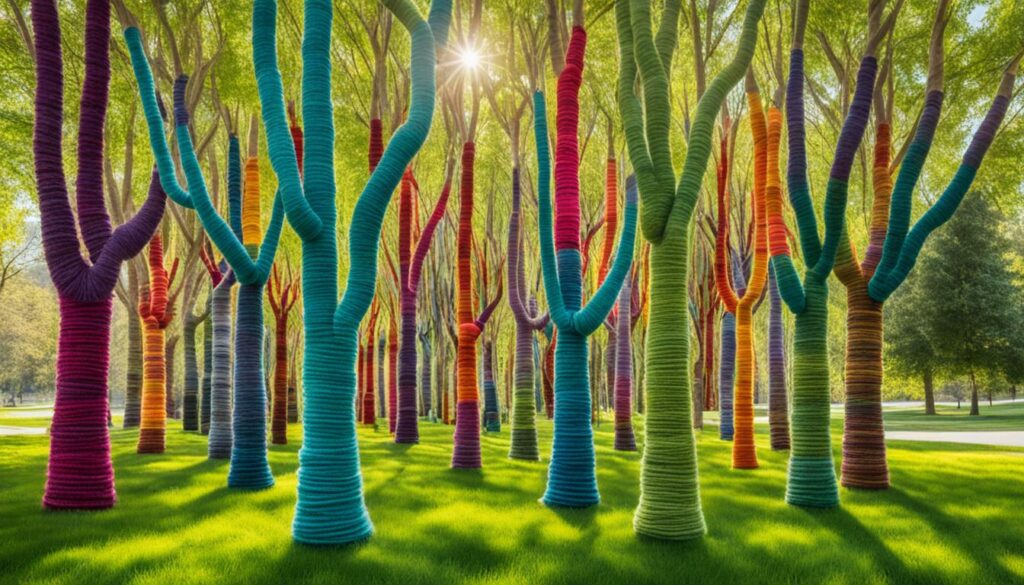
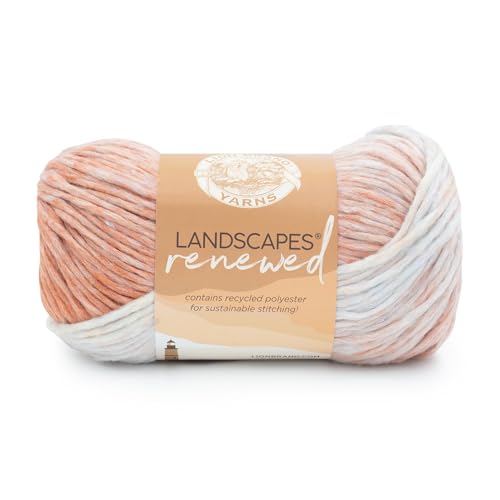
Lion Brand Yarn Landscapes Renewed, Recycled Multicolor Yarn for Knitting, Desert Spring, 1 Pack
Each skein weighs 5.3 oz/150g; Each skein measures 260y/238m
As an affiliate, we earn on qualifying purchases.
As an affiliate, we earn on qualifying purchases.
Understanding Different Types of Eco-Friendly Fibers
When it comes to sustainable yarns, there are various eco-friendly fibers to choose from. These fibers not only offer environmentally conscious options but also provide unique properties for your crafting projects. Let’s explore the different types of eco-friendly fibers:
Bamboo Fiber
Bamboo fiber is derived from the pulp of the bamboo plant, making it a renewable resource. It is known for its breathability, allowing for better airflow and moisture absorption. This makes bamboo yarn an excellent choice for lightweight and comfortable garments. Additionally, bamboo fiber is hypoallergenic, making it suitable for those with sensitive skin. Embrace the natural benefits of bamboo with this sustainable fiber option.
Organic Cotton
Organic cotton is grown without the use of harmful pesticides and chemicals, making it a popular choice for eco-conscious individuals. By choosing organic cotton yarn, you support sustainable farming practices and promote a healthier environment. Craft with organic cotton yarn to create soft and breathable projects while reducing your ecological footprint.
Hemp Fiber
Hemp fiber is derived from the cannabis sativa plant, which grows quickly and requires minimal water and pesticides. It is one of the most sustainable fibers available, making it an ideal choice for eco-friendly crafting. Hemp yarn is known for its durability, strength, and absorbency. Create long-lasting and versatile projects with hemp yarn, knowing that you are making a positive impact on the planet.
Recycled Polyester
Recycled polyester yarns are made from post-consumer waste materials such as plastic bottles and textiles. By choosing recycled polyester, you contribute to waste reduction and promote recycling. Recycled polyester yarns offer versatility and durability, ensuring your projects stand the test of time. Join the movement towards sustainability by incorporating recycled polyester yarn into your crafting endeavors.
| Fiber | Properties |
|---|---|
| Bamboo Fiber | Breathable, hypoallergenic |
| Organic Cotton | Soft, breathable |
| Hemp Fiber | Durable, absorbent |
| Recycled Polyester | Versatile, sustainable |
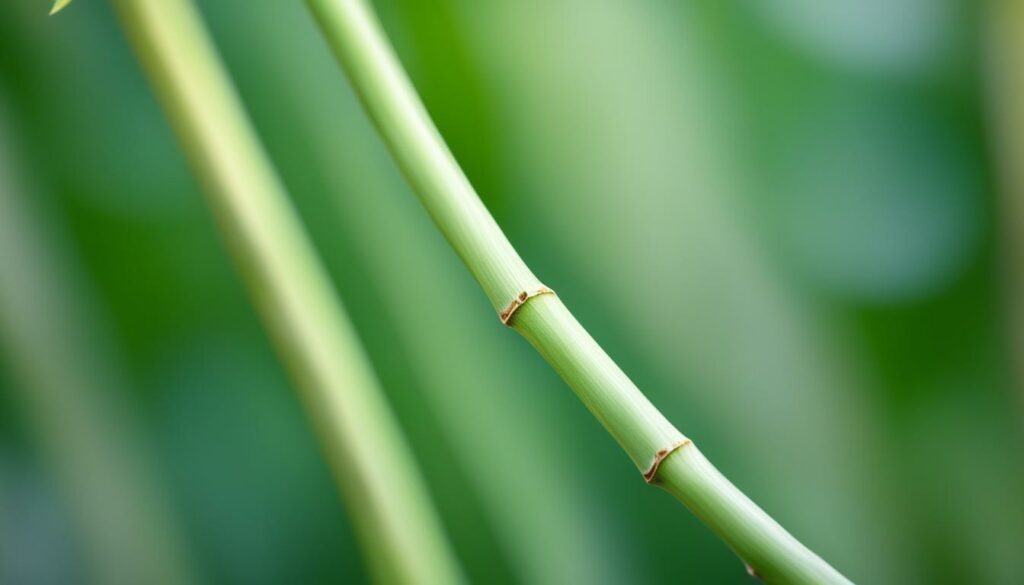

Lion Brand Yarn Wool-Ease Recycled Light Worsted-Weight Yarn for Knitting and Crochet, Terracotta, 1 Pack, Wool and Acrylic Blend Fiber Perfect for Scarves, Hats and Blankets, 196 Yards
SOFT, COZY RECYCLED YARN: Wool-Ease Recycled is designed for knitters and crocheters who want warmth without bulk. Perfect…
As an affiliate, we earn on qualifying purchases.
As an affiliate, we earn on qualifying purchases.
Benefits of Using Sustainable Yarns
Using sustainable yarns provides several benefits. These yarns are environmentally friendly, as they are made from renewable resources and produced using responsible practices. By choosing sustainable yarns, you can take a small but significant step towards reducing your environmental impact.
Not only are sustainable yarns better for the environment, but they also offer health benefits. Unlike traditional yarns that may contain harmful chemicals and pesticides, sustainable yarns are free from these toxins. This means that when you use sustainable yarns, you can create projects without worrying about exposing yourself or your loved ones to potentially harmful substances.
Another advantage of using sustainable yarns is the support they provide to local communities. The production of sustainable yarns often involves manual labor and provides economic opportunities for individuals in these communities. By choosing sustainable yarns, you contribute to the well-being of these communities and support ethical and sustainable practices.
Durability is another key advantage of sustainable yarns. These yarns are designed to last, resulting in longer-lasting garments and projects. This durability not only saves you money in the long run but also reduces the need for constant replacements and reduces waste.
The versatility of sustainable yarns is also worth mentioning. They can be used for a wide range of applications, including knitting, crocheting, weaving, and more. Whether you’re creating a cozy blanket, a fashionable sweater, or a unique home decor item, sustainable yarns offer the flexibility and adaptability needed to bring your creative visions to life.
| Benefits of Using Sustainable Yarns | Description |
|---|---|
| Environmentally Friendly | Made from renewable resources and produced using responsible practices. |
| Health Benefits | Free from harmful chemicals and pesticides, ensuring a safer crafting experience. |
| Support for Local Communities | Production involves manual labor, providing economic opportunities for communities. |
| Durability | Long-lasting yarns that result in durable and resilient projects. |
| Versatility | Applicable for a wide range of crafting techniques and projects. |
By embracing sustainable yarns, you not only create beautiful and unique creations but also contribute to a more environmentally friendly and socially responsible world. Start incorporating sustainable yarns into your crafting projects and experience the many benefits they offer.
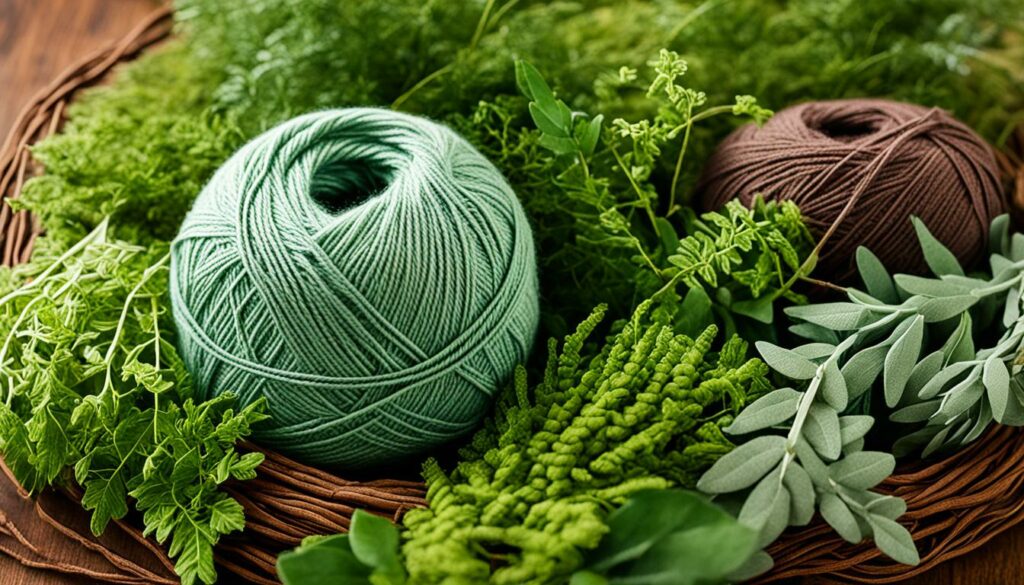
Where to Find Organic Cotton Yarns
As demand for sustainable fibers continues to grow, organic cotton yarns are becoming increasingly available. Many reputable yarn companies now offer organic cotton options, and there are also specialty eco-friendly online marketplaces that serve as excellent sources for these yarns.
When purchasing organic cotton yarns, it is crucial to ensure their authenticity. Look for certifications such as the Global Organic Textile Standard (GOTS), which guarantees that the yarn is truly organic. GOTS certification ensures that the entire production process, from cultivation to processing and labeling, meets strict environmental and social criteria.
By choosing organic cotton yarns, you not only support sustainable and ethical practices but also contribute to the reduction of environmental harm caused by traditional cotton production methods.
Benefits of Choosing Organic Cotton Yarns
Organic cotton yarns offer several advantages that make them an ideal choice for eco-conscious crafters:
- Environmental Sustainability: By opting for organic cotton yarns, you are supporting sustainable farming practices that prohibit the use of synthetic fertilizers and toxic pesticides. This reduces soil and water contamination, champions biodiversity, and promotes a healthier ecosystem.
- Health Considerations: Organic cotton yarns are free from harmful chemicals, making them a safer choice for those with sensitive skin or allergies.
- Superior Quality: Organic cotton is known for its exceptional softness and breathability, making it comfortable to wear and work with.
- Versatility: Organic cotton yarns are available in a wide range of weights and colors, making them suitable for various projects, from delicate garments to cozy blankets.
Embrace the sustainable qualities of organic cotton yarns and create beautiful, environmentally friendly pieces that have a positive impact on both your crafting and the planet.
Where to Buy Organic Cotton Yarns
When searching for organic cotton yarns, consider exploring the following reputable sources:
- Brick-and-Mortar Yarn Stores: Check local yarn stores in your area as they may carry a selection of organic cotton yarns. Make sure to inquire about the yarn’s organic certification and sustainability standards.
- Online Yarn Retailers: Many popular online yarn retailers now offer organic cotton options. When shopping online, read product descriptions, and verify certifications.
- Eco-Friendly Marketplaces: Specialty eco-friendly online marketplaces like EcoEnclose and EarthHero are dedicated to environmentally conscious products. These marketplaces often have a curated collection of organic cotton yarns from various brands.
Remember to compare prices, check customer reviews, and ensure the authenticity of the organic cotton yarns before making a purchase.
| Retailer | Website |
|---|---|
| Yarnspirations | https://www.yarnspirations.com/ |
| Lion Brand Yarn | https://www.lionbrand.com/ |
| Hobbii | https://hobbii.com/ |
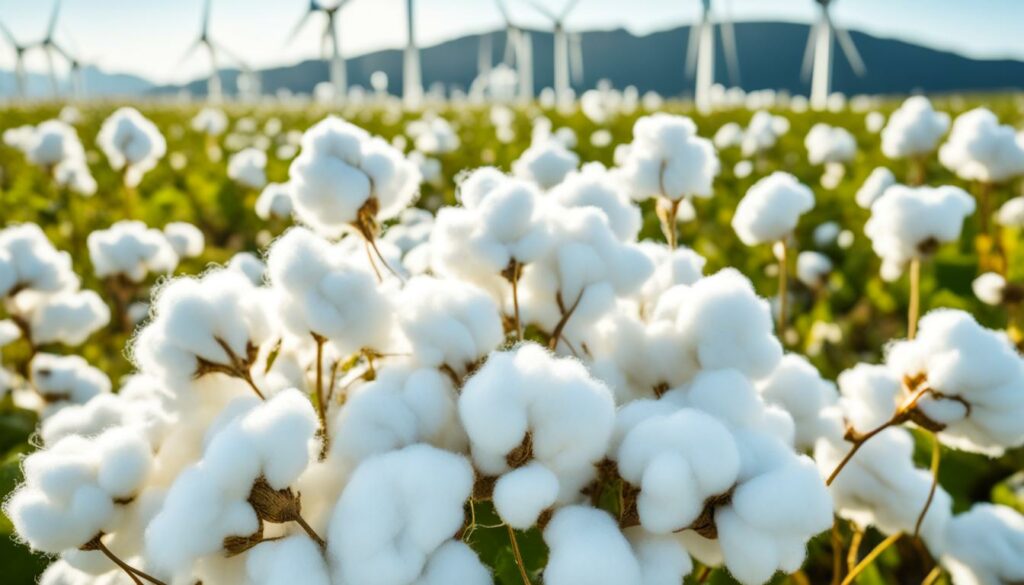
When you buy organic cotton yarns, not only do you support sustainable practices, but you also join a community of crafters dedicated to minimizing their environmental impact. Let your next project be a testament to your commitment to a greener, more conscious future. Happy crafting!
Exploring Bamboo Yarns for Eco-Friendly Crafting
Bamboo yarns are an excellent choice for eco-friendly crafting. They are derived from the bamboo plant, which grows quickly and requires minimal water and pesticides. The production process involves crushing the bamboo stalks and extracting cellulose fibers, which are then treated with chemicals to create the yarn. Bamboo yarns are naturally antibacterial, moisture-wicking, and come in a range of vibrant colors.
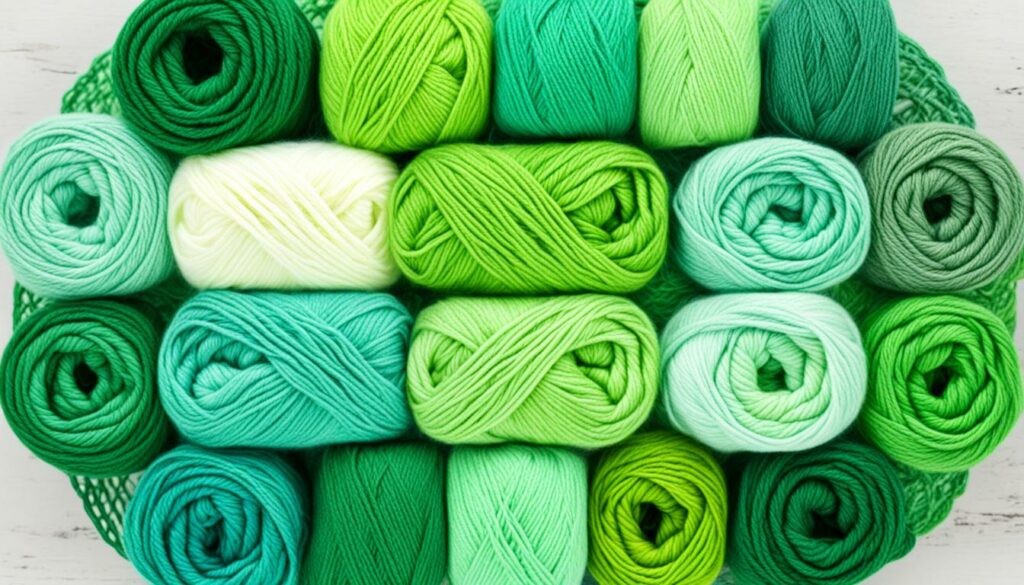
However, it is important to be aware that some bamboo yarns may be blended with synthetic fibers, which can affect their eco-friendly benefits.
| Benefits of Bamboo Yarns | Why Choose Bamboo Yarns? |
|---|---|
| Bamboo yarns are naturally antibacterial, keeping fabrics fresh and odor-free. | Bamboo yarns provide antibacterial properties, making them ideal for garments that need to stay fresh and odor-free. |
| Bamboo yarns have moisture-wicking properties, keeping the skin dry and comfortable. | Bamboo yarns offer moisture-wicking benefits, ensuring garments keep the skin dry and comfortable even during physical activities. |
| Bamboo yarns come in vibrant colors, adding a touch of vibrancy to your projects. | Bamboo yarns offer a wide range of vibrant colors, allowing you to create visually stunning and colorful projects. |
Bamboo yarns are not only eco-friendly but also provide unique properties that make them exceptional choices for crafting. Their natural antibacterial and moisture-wicking attributes help create garments that are hygienic and comfortable. Additionally, the vibrant colors available in bamboo yarns allow for visually appealing and creative projects. However, it is important to check the composition of the yarn to ensure its eco-friendly qualities are not compromised by synthetic blends.
Embracing Hemp Yarns for Sustainable Projects
Hemp yarns are gaining popularity as a sustainable alternative for eco-friendly crafting. Made from the cannabis sativa plant, hemp is a natural fiber that offers a range of sustainable properties that make it an excellent choice for environmentally conscious crafters.
One of the key advantages of hemp yarns is their durability. Hemp fibers are known for their strength and resistance to wear and tear. This means that items made from hemp yarns have a longer lifespan, reducing the need for frequent replacements and ultimately reducing waste.
In addition to its durability, hemp yarns also have excellent absorbency. Hemp fibers can absorb moisture efficiently, making them ideal for items that need to keep the wearer dry and comfortable. This absorbency also allows hemp yarns to dye easily, resulting in vibrant and long-lasting colors.
When it comes to summer clothing, hemp yarns are a top choice. Their natural breathability allows air to flow freely through the fabric, keeping the wearer cool and comfortable even in hot weather. The moisture-wicking properties of hemp fibers further contribute to the comfort of summer garments, as they help to draw sweat away from the skin.
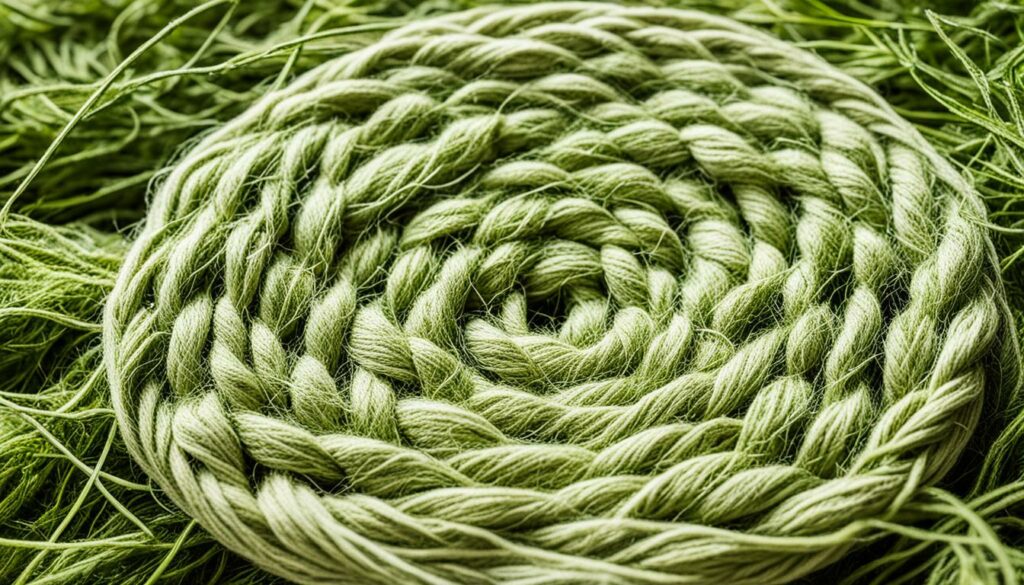
With its sustainable properties, durability, absorbency, and suitability for summer clothing, it’s no wonder that hemp yarns are becoming increasingly popular among eco-conscious crafters.
Benefits of Hemp Yarns
To summarize, here are some of the key benefits of using hemp yarns for sustainable projects:
- Sustainable properties: Hemp cultivation requires minimal water, pesticides, and herbicides, making it an environmentally friendly choice.
- Durability: Hemp fibers are known for their strength and resistance to abrasion, resulting in long-lasting items.
- Absorbency: Hemp yarns have excellent moisture absorption properties, keeping the wearer dry and comfortable.
- Ideal for summer clothing: The breathability and moisture-wicking properties of hemp make it a perfect choice for creating comfortable summer garments.
Next, let’s explore another sustainable yarn option: recycled yarns.
The Value of Recycled Yarns in Eco-Friendly Crafting
Eco-friendly crafting encompasses various practices aimed at reducing environmental impact and promoting sustainability. One crucial aspect of eco-friendly crafting is the use of recycled yarns, which offer numerous benefits to both crafters and the planet. By utilizing these yarns, we can contribute to reducing landfill waste and supporting a more sustainable future.
Recycled yarns are created from post-consumer waste materials such as plastic bottles and textiles. By repurposing these materials, we minimize the amount of waste that ends up in landfills, effectively reducing our environmental footprint. Recycling yarn not only diverts waste from overcrowded landfills but also helps conserve natural resources by reducing the demand for new raw materials. It’s a simple yet powerful way to make a positive impact on the environment.
One of the key advantages of recycled yarns is their versatility. They can be used for a wide range of projects, from knitting and crocheting to weaving and macramé. Crafters can unleash their creativity and incorporate recycled yarns into various designs, including garments, accessories, home decor items, and more. This versatility allows us to create beautiful, eco-friendly products without compromising on style or quality.
Aside from their versatility, recycled yarns offer sustainability benefits. By choosing to work with these yarns, we actively participate in the circular economy, where waste is transformed into valuable resources. This sustainable approach helps mitigate the environmental impact of traditional yarn production processes while promoting a more conscious and responsible way of crafting. As crafters, we have the power to make a difference by actively choosing sustainable materials such as recycled yarns.
“Recycled yarns are a great example of how creativity and sustainability can go hand in hand. By incorporating these yarns into our projects, we not only contribute to reducing waste but also inspire others to make more eco-conscious choices.”
When using recycled yarns, it’s important to prioritize quality and ensure that the yarns are sourced from reputable suppliers. Look for certifications such as Global Recycled Standard (GRS) or Recycled Claim Standard (RCS) to ensure that the yarns are made from genuine post-consumer waste. Additionally, explore the wide array of recycled yarn options available today, ranging from soft and cozy blends to vibrant and textured varieties.
Let’s embrace the value of recycled yarns in our eco-friendly crafting endeavors. By incorporating these sustainable materials into our projects, we contribute to reducing landfill waste, promoting circular practices, and crafting a more sustainable future.
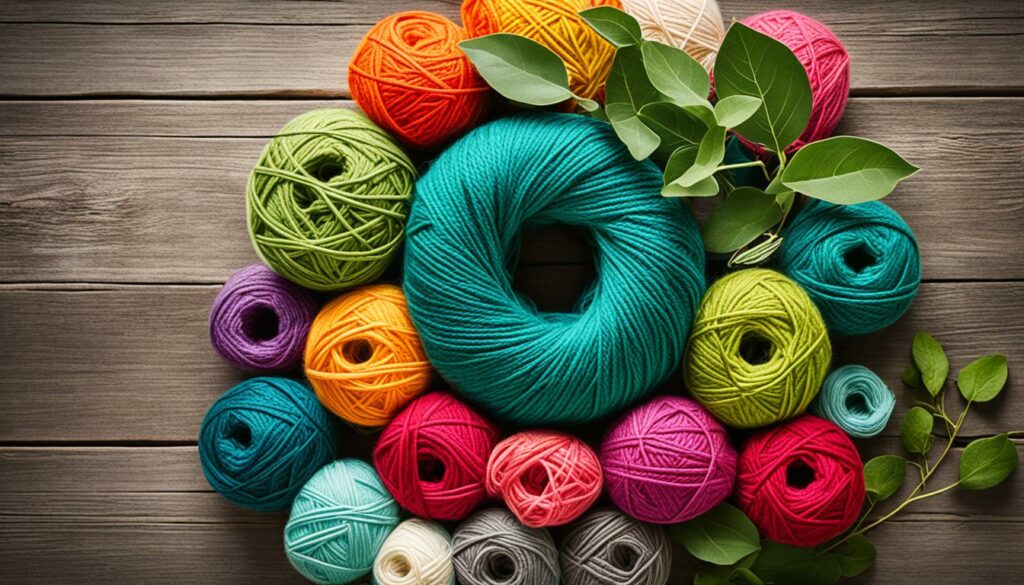
Conclusion
Yarn, when carefully chosen, can be a sustainable and eco-friendly option for crafters. By opting for sustainable yarns such as organic cotton, bamboo, hemp, and recycled options, we can significantly reduce our environmental impact and support ethical production practices. Making conscious choices in our crafting materials is a small but significant step towards creating a more sustainable future.
By embracing eco-friendly crafting, we can contribute to minimizing the environmental impact of the textile industry. Sustainable yarns offer a range of benefits, from softness and breathability to durability and versatility. Not only are they better for the environment, but they also ensure a healthier experience for us, free from harmful chemicals and pesticides.
As we make more informed choices in our crafting supplies, we actively support the reduction of landfill waste and the conservation of natural resources. By using sustainable yarns, we play a part in promoting a circular economy and protecting the planet for future generations. Together, let’s continue to prioritize eco-friendly crafting and make a positive environmental impact.
